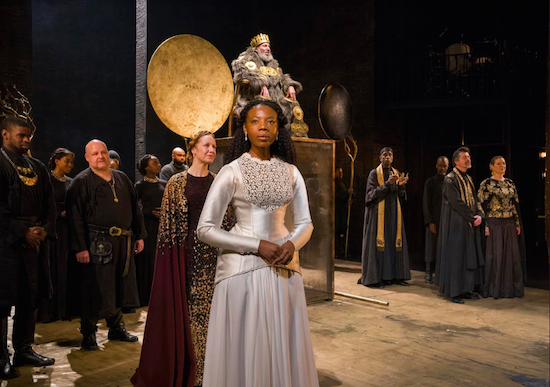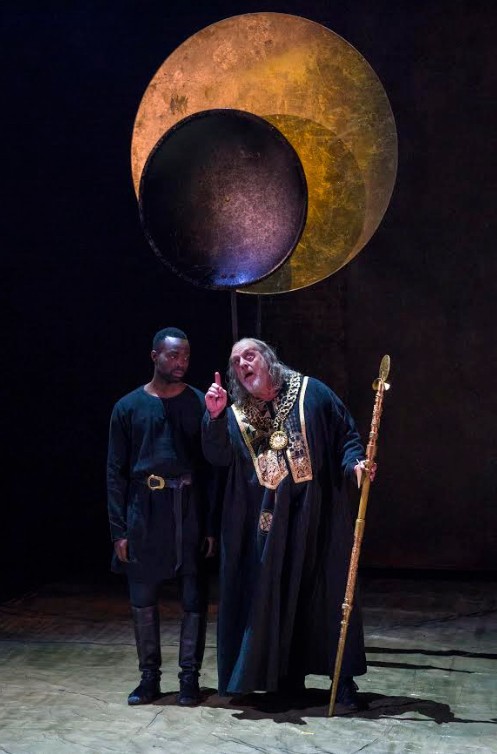
Royal Shakespeare Company’s King Lear at BAM whittles humanity to its essence

Go ahead and start a conversation about a powerful leader who makes impulsive decisions based upon which of his subordinates flatters him best, but don’t specify who it is. Who instantly pops into people’s minds? I know what you’re thinking: the subject of the latest Sunday night drubbing on network television. But you could also be talking about Shakespeare’s King Lear.
Donald Trump isn’t on the menu in the Royal Shakespeare Company’s production of King Lear, now playing at the Brooklyn Academy of Music. As a matter of fact, Gregory Doran, RSC’s artistic director, said his rendition of Shakespeare’s epic tragedy has little connection with the American president, even if he does share more than a few similarities with the rash, narcissistic tyrant at the center of a play penned at the beginning of the 17th century. Trumpean trappings were grafted onto Shakespearean characters in the Public Theater’s production of Julius Caesar in New York last summer, but Doran said the bluntness of the comparison detracted from Shakespeare’s story and characters. (Arin Arbus, who directed “The Winter’s Tale” around the corner at the Theater for a New Audience, had a similar opinion of a Trump-Shakespearean tyrant connection.)
What Lear does tease out from modern life, Doran said, is a timeless human dynamic: abuse of power. Here we have an ancient story—adapted by Shakespeare from a contemporary play relating the legend of King Leir of Britain—about a king who seeks flattery from his daughters when he’s about to divvy up his estate between the three of them. The two eldest put on their best act and get the lion’s share of his riches and power. The third daughter, his erstwhile favorite, can’t bring herself to embellish her love for him, and is denied her inheritance and banished from his kingdom. Having given away his power, Lear soon finds himself stuck between two daughters who don’t honor him as they said they had. And let’s not forget the subplot between one of Lear’s loyal advisers and his two sons, one born of a wife, the other of a mistress (and not happy about it). As you can imagine, the end result is a grandiose mess, replete with murder, betrayal, eye-gouging and at least one attempt at adultery.
“Shakespeare doesn’t get less relevant, he gets more relevant,” Doran said. “He’s a magnet — he catches all the iron filings from around the world.”
Doran’s Lear, Sir Antony Sher — who is both his artistic collaborator and his civil partner — pointed out that there’s little among humankind’s traits that the Bard missed.
“There’s no other writer who has written about humanity quite this way,” Sher said. “Here we are 400 years later and we’re still the same creatures.”
Two years ago, when Sher played a thoroughly enjoyable Falstaff in the RSC’s production of the Henriad plays (which were also staged for a time at BAM’s Harvey Theater), the troupe traveled to China, where they were unsure how audiences would react to Shakespeare.
“We kind of held our breath and said, ‘What are they going to make of this play about this English king, Henry IV?’ But they got it,” he said. “Whether you’re from Beijing or Stratford-upon-Avon, you know about dysfunctional father-son relationships and you know about fat old bullshitters propping up the end of the bar.”
King Lear — which strips several characters of their societally-derived trappings — is the ultimate play about flawed humanity laid bare. Even the setting for all that spiritual nakedness — a storm-ravaged wilderness — pulls Lear and the others Shakespeare chose to divest of their courtly status out into the open, more or less alone with their thoughts. It’s a situation many leaders could benefit from — being bare, alone, separated from business suits, meritorious medals, positions of importance, family allegiances and Twitter. Shakespeare explains this simplification of man best, through the words of a half-mad King Lear: “Is man no more than this?”
And also, “They told me I was everything. ‘Tis a lie.” It’s a strong message for anyone, whether world bank president or waiter, and speaks to the power of debasement and detached self-reflection.
“If you’ve lived your life thinking you’re invincible, it’s going to be a a shock when you find out it’s not true,” Doran said.
Lear’s is a murky journey, but Doran says darkness is a shade Shakespeare paints well. One of the play’s most bizarre scenes mashes a madman, a blind man, a heartbroken fool and a man pretending to be a deranged beggar all into one windswept waste. Despair prevails.
“There are times when Shakespeare throws someone to rock bottom and says, ‘How can humanity pick itself back up?'” he said.
The RSC has long been known for its strict constructionist approach to Shakespeare. When I talked Sher about what he brought to Lear as an actor, both he and Doran said they felt that it was important not to put too much of one’s own spin onto Shakespeare’s characters. Sher said that although there’s always some interpretation, the plays are best read as written.
“It’s immensely difficult to do because Shakespeare demands so much of an actor,” he said. “But if you meet that challenge and you can read what he wrote, that’s something in itself.”
From the audience perspective, though, it doesn’t seem that simple. Even something that might seem like a minute difference of interpretation — the way an eyebrow is raised, the inflection of a certain word—can change so much about a character’s. Take Goneril’s words of praise for her father in the play’s opening scene. Nia Gwynne could have read the oldest daughter’s lines with every ounce of acidity or duplicitous sweetness she could muster. Instead, facing the audience, she falters, wearing an expression that says the enunciation of such flattery feels painful, unnatural to her. Paapa Essiedu — who delivered the play’s standout performance — squeezed every last drop of scornful villainy out of Edmund, switching it off in an instant to offer earnest loyalty to characters his sought to dupe. Under Doran’s direction, furthermore, the role of the two elder daughters — who in centuries past could very well have been pushed toward complicity in Lear’s original sin — were transformed throughout the drama from hesitant participants in the charade to full-blown conspirators in the greed storm that followed. They didn’t start out evil, but evil changed them, and they emerged as enraged leaders.

Neither Sher — a wonderful actor who brings such tenderness to Lear’s low moments — nor the storm in Act III thunder the way I thought they would (I expected madder madness and a more convincing storm). But as always, RSC creates from Shakespeare a nuanced world worth immersing oneself in for a few hours. Certain critics may have disdained parts of the performance, but regardless of whether or not you agree with Doran’s interpretation of the classic tale, RSC’s presentation is excellent as always, and done in a way that makes it fairly easy for a modern audience to follow along with Shakespeare’s anachronistic Elizabethan language.
For Doran and Sher, that’s part of the point — to peform Shakespeare well so that interest continues for centuries to come. They said exposing children to Shakespeare the way it was meant to be consumed —onstage and before anyone had a chance to tell them it was “difficult” — was an important way to attract new aficionados to the canon.
“Then, as you you grow up, there are things about Shakespeare’s philosophy and politics that grab you, and in this memorable language,” Doran said.
As anyone who’s been force-fed the Bard’s plays in school knows, the words can seem a bit flat when assigned by a beleaguered teacher in book form, to be read quietly at home.
“Seeing experienced Shakespearean actors perform that language is the best way to experience it,” Sher said. “It was never intended to be read. It was intended to be performed.”
Having twice climbed the Everest of classical acting in the role of Lear, Sher — who has dedicated nearly 50 years of his life to journeying through Shakespeare’s mammoth roles — has said this one would be his last. With any luck, his passionate devotion over the decades has inspired a crop or two of new actors to pick up where he left off. Now more than ever, the world needs stories about the humanity, recklessness and corruption behind power. It will certainly need them again in the future, for ’tis the time’s plague when madmen lead the blind.
Leave a Comment
Leave a Comment

